How to Build frustration tolerance in kids with ADHD
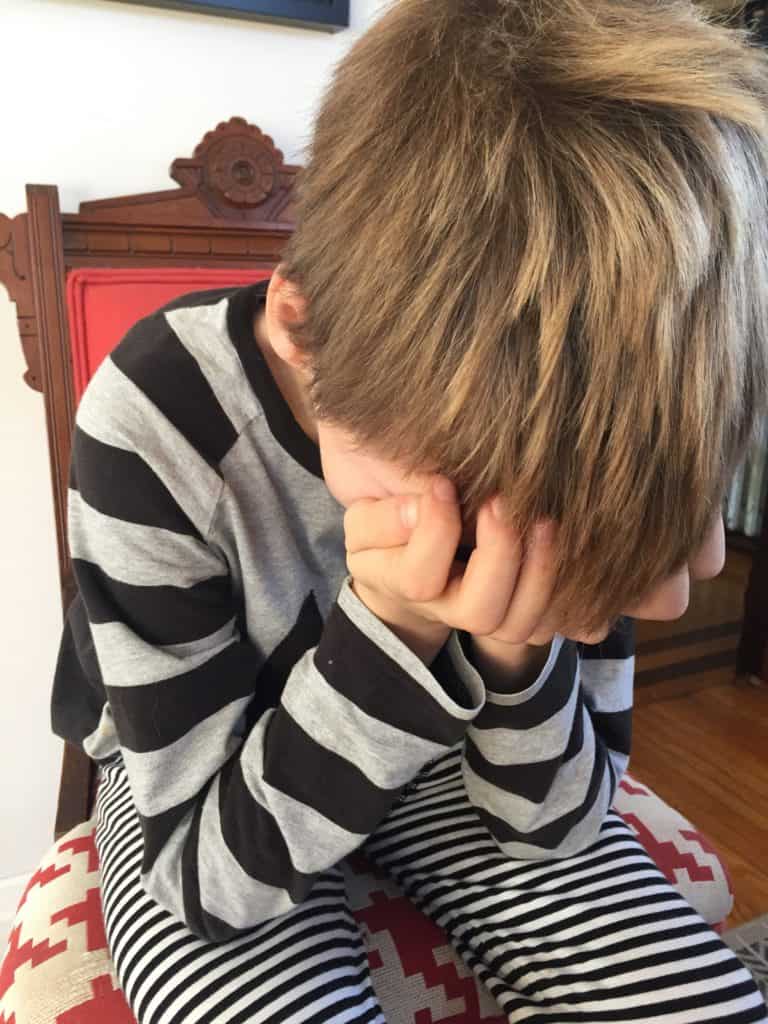
A lovely reader asked me a question about building frustration tolerance in kids with ADHD. My response to her got so long that I decided to create a whole post about helping easily frustrated and angry kids.
It really got me thinking about how easily frustrated my own ADHD kids can get at times. To an outsider, our ADHD kids can come across as spoiled and bratty, having a tantrum over not wanting to do something.
But, we know differently.
Our children are neither spoiled, nor bratty. I always stick to the notion that kids do better when they can. Thank you, Ross Greene!
We need to remember that ADHD is a developmental condition and our kids are simply still developing the ability to process their emotions and deal with them in an age-appropriate way. We need to look at their behavior as being caused by lagging skills.
Kids with ADHD usually lag behind more typically developing kids by up to 30%. I usually think of it in this way – I have a kid who is developmentally about 8, navigating 12 year old issues.
Does your kiddo have a very low frustration tolerance? Do certain uncomfortable or difficult situations send them reeling with anger and big emotions? Do they give up easily when attempting new or difficult tasks? You are not alone! Read on to find some concrete ways to build frustration tolerance in your own children.
Notice when your child is frustrated
The first step is noticing when your child is triggered. It may seem like the incidents are random or happen over just about everything, but you will most likely find some commonality amongst your child’s outbursts. It might be helpful to keep track of these moments for a few weeks in a journal or on your calendar
The following list that may help you start to see some patterns:
Common frustration triggers for kids:
- Transitions(waking from sleep, leaving the house, going to bed)
- Challenging academics – yes, even as young as preschool.
- Doing something unfavorable such as chores or homework
- Exhaustion or hunger
- New social situations, meeting new people or being around certain peers
- Breaking from the normal routine
- Generalized fear
- Not liking what is served for a meal
Think about tackling one or two at a time
Once you get a list of the situations that trigger frustration in you kiddo, choose one or two to tackle at a time.
Pick the situation that brings your kids the LEAST upset and start there. By starting with an easier one to tackle, your kids will slowly feel more confident as they build their “frustration muscles”.
Tips for Building Frustration Tolerance:
Tip #1: Talk to your kids about their frustration.
This is straight from Ross Greene’s The Explosive Child, a book I highly recommend. His philosophy is built on the idea that when children can do better, they will. Our kids do not want to be “in trouble” or acting out, rather they have lagging skills that keep them from dealing with their emotions in a age-appropriate manner.
So, you must become a detective and try to find out what the underlying problem is. Take some time to talk to your child about a recent explosion, – when everyone is calm and out of the stressful situation.
There is, just simply, no use in talking to your child in the middle of a melt down.
So when things are calm, open with a question like, “I noticed that you had a hard time with your math homework yesterday, whats up?”
Stay open to the answer. It may take many times of asking and being open to talking this through for you kiddo to offer up his thoughts. The big idea here is that you are collaborating with your child to come up with a way to handle their lagging skills.
Related: How I learned to parent my explosive ADHD child
Tips #2: Brainstorm solutions with your child
After you know what the underlying concern is, you can begin to brainstorm solutions. You want to make sure that the solution meets all of your needs.
To go with the homework example from above, your kid may suggest that he just doesn’t do his work. Okay, that is a solution, but it probably doesn’t address your concerns of him getting an education.
Try not to shoot down ideas, yet. Write them all down, including yours and then go back thru them and see if they meet BOTH of your needs.
Solutions to the homework issue might include: Having a snack first, then doing homework, chunking the homework into parts, trying to get homework reduced thru a 504 plan, sitting with a parent or older sibling to have nearby help, getting a tutor, doing homework at the library right after school.
This stuff works – here’s an example from my own life to give you more ideas.
A great example from my own life.
My oldest son refused to clean the litter box – just outright refused. He had been doing this chore without a problem for months. It was strange that he was being so adamant, so I wanted to know more.
In the moment of him refusing, I backed off and did not force him – this would have only escalated the situation. But the next day I opened, with, “I noticed you did not want to clean the litter box last night, what’s up?”
After a little discussion, it came out that he did not like going out to the garbage can in the alley because it was now getting dark earlier. He was afraid. This was an amazing revelation for me, because this was something that had not even occurred to me.
This process yields such great information!
We brainstormed a way around it (He could just leave the plastic bag on the porch outside until morning) and now, he rarely argues about this particular chore!! Brilliant!!
Again, Ross Greene’s books and website will offer you some great advice and a more step by step approach to his Collaborative Problem Solving model. This was a whole new way of reacting(or not reacting!) to my boys, that it took awhile to understand the process. He also has a great podcast!
Tips #3: Know ahead of time how you’ll react.
You know the old saying, “It takes two to tango”. Your reaction to your kids’ display of frustration can have a huge impact. But in the moment, we can be really triggered and not be our best selves.
That’s why it is so important to come up with a few scripted things to say when your child’s frustration mounts. A calm reaction to your child’s frustration can have a powerful effect and help the situation deflate quickly.
Find a phrase or two that works for you:
- “I see you are upset. Is there some way I can help?”
- “Why don’t you take a little break and go read a bit.(jump on the tramp, go outside, etc.)
- “I know you don’t want to do your homework right now. Let’s get everything set up and ready to go before you take a 10 minute break. Then we will sit down together to work on your homework together for 15 minutes.”
- “It’s not okay to yell at me. I will leave you alone and if you think of something I can do to help, let me know”
- “Okay.”(walk away) Even when I walk away, I stay relatively close by to make sure everyone is safe.
Be aware – your calmer reaction may take your child by surprise.
This strategy helps me so much – I avoid much of the yelling, the fighting, and the nagging this way. Everyone benefits, especially my son, who is able to keep himself much calmer.
Now, don’t think this came overnight for me. There were lots of power struggles and yelling before I came to this. I’m hoping you can avoid some of that by taking a proactive approach.
 Tip #4: Work breaks into frustrating tasks.
Tip #4: Work breaks into frustrating tasks.
Offer breaks before, during or after a frustrating activity to help kids get thru it. This helps to show them you understand how hard it might be for them and that you are willing to offer some help. The task may not seem so ominous if it can be broken down into several parts.
We all know that starting is the hardest part.
Taking breaks can help chunk the activity down into doable steps to make it more manageable. Breaking homework down into 15 minute sessions has been a life-saver for our family. Which leads us to the next tip:
Tip #5: Set a timer.
ADHD kids usually have some degree of time blindness – they think things will take much longer than they actually do. My son’s frustration plummets when he knows he can sit for smaller amounts of time -15 minutes for homework, or practice his baritone for 20 minutes. This timer is great because it provides a visual representation of time and it gives my kids a growing sense of time!
We have one at home and one at school! I think we use it everyday. It’s also been a life saver for limiting screen time(WooHoo!!).
Tip #6: Set up a routine.
The more you can work frustrating activities into your regular routine, the easier it is for kids to just accept that they are happening and the less frustrated the get over time. Routines just become a habit and something they “just do” – it takes the surprise element out of an undesirable activity.
Routines work well for recurring activities, like chores or practicing an instrument.
Routines are a great thing to work out collaboratively with your kids and write down on a family calendar for all to see.
We have a weekly meeting to discuss our family calendar. My kids write down their events and responsibilities, like chores or practicing an instrument. My boys are less likely to complain because they chose the routine.
Routines work really well in our family with household duties. Saturday morning is family chore time. The litter box always gets cleaned at night. The floor is swept after every meal. I get little push back now because these have just become such a part of our daily or weekly routine.
Tip #7: Do the activity with them – for awhile:
Helping your child to get thru a frustrating task can grow their confidence and help them to eventually be able to do the task on their own. Look thru your list of difficult triggers and see if there is some way you can assist.
I sit at the table while my son is doing homework. When it’s time to clean the dreaded bathroom, I usually clean the bathtub while my kids do the sink and the toilet.
Both of my kids are much more compliant if I keep myself close. I don’t want them to rely on me all the time, but this is a great step in the right direction.
Tip #7: Play games together as family!!
Many kids get easily frustrated over games. Whether it’s complicated rules, or fear of loosing, games can cause a rise in frustration for many kids.
This has never been a particularly trying activity for either of my kids, but I do think that by playing a lot of games as a family, we have upped my kids ability for frustration, in general.
By using an activity that is seen as fun and playful, it may lessen frustration and teach them how to deal with these feelings when they bubble up.
We’ve slowly chosen more challenging games or puzzles as my kids have gotten older. Modeling proper sportsmanship helps, as well as playing in teams to lessen the blow if loosing causes too much frustration.
Start with more cooperative games, like this one or this one before moving on to more challenging ones.
Our current favorites are Labyrinth, Cat Crimes, Oregon Trail, Sorry, Payday, and Memory.
Tip #8: Avoid the power struggle.
Somedays nothing seems to works and I just answer “Okay, maybe later” to my son’s defiance and just walk away. Very few things are worth getting in a power struggle over.
The wonderful thing is that 9 times out of 10, he usually comes around and approaches me about doing whatever he refused to do earlier.
Kids with ADHD can be impulsive and often say or do things without even realizing it. It can take them a bit of time to mull over the situation and realize that what you are asking is not that bad or too difficult.
Tip #9: Stop arguing with reality.
When we argue with reality we set ourselves up for failure. It’s just not realistic to think my son’s outbursts of frustration and emotion won’t happen.
Remember that this is a stage that your kids are going thru. The stage may be lasting longer than your thought or perhaps you imagined it would be over by now, but again, ADHD is a developmental diagnosis.
I know that certain situations will be difficult(returning to school after a vacation, cleaning bedrooms, etc.) and I have no illusions what so ever. I prepare myself with my calm scripted reactions and do the best I can to help my kids (and myself!) get through it.
Parenting an easily frustrated kiddo takes patience, understanding and time. Things may not get better overnight, but once you find the best way to help your kid work through his triggers and build that frustration tolerance both you and your child will feel more confident.
You can do this!!
Remember, there is nothing wrong with your child. It’s all about working together to building those lagging skills.
I’d love to hear what works for your family. Please leave a comment to connect and help other families in this season of life.
Pin for later!
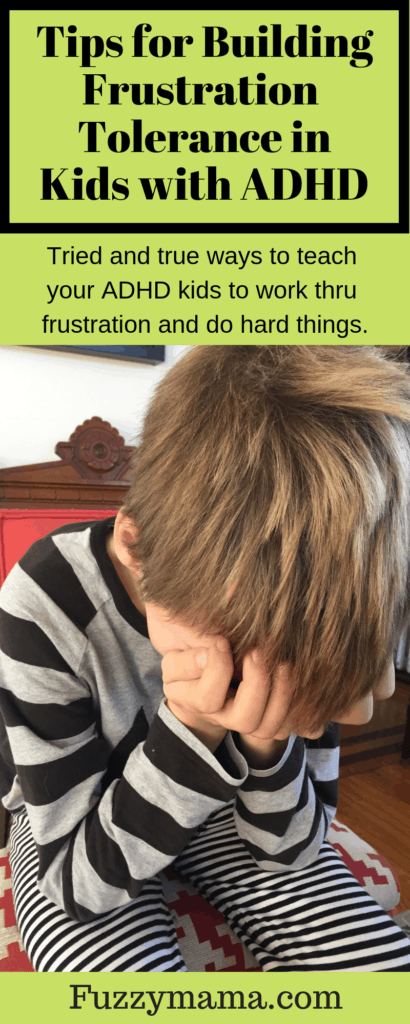

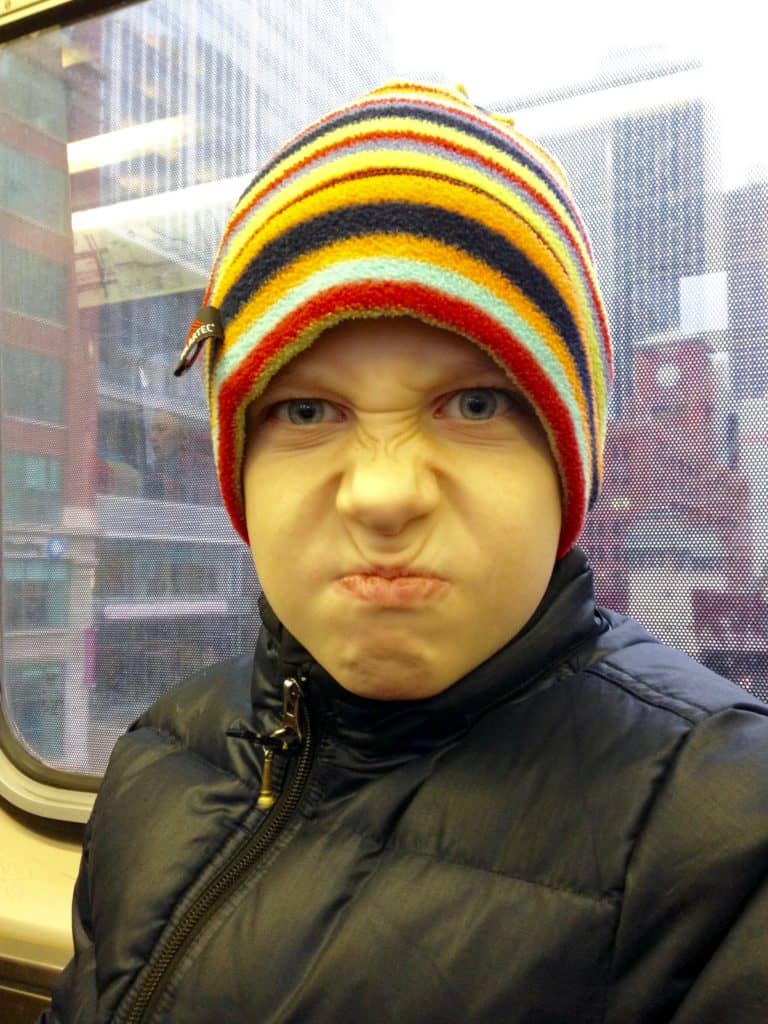
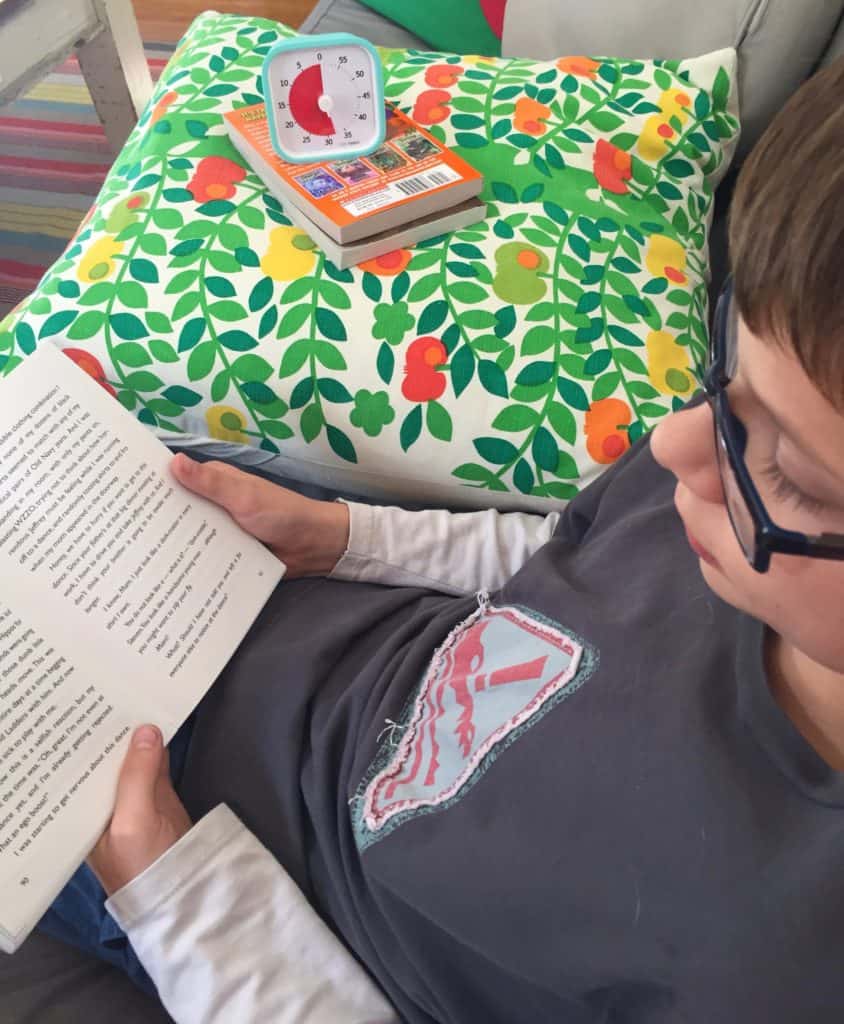 Tip #4: Work breaks into frustrating tasks.
Tip #4: Work breaks into frustrating tasks.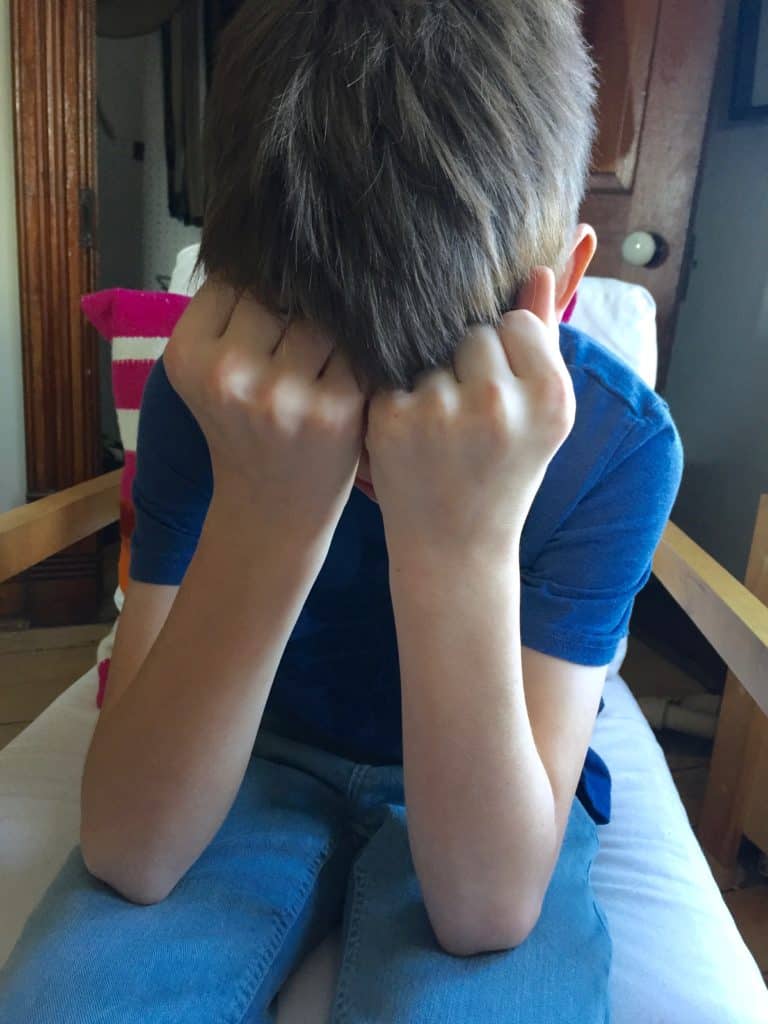

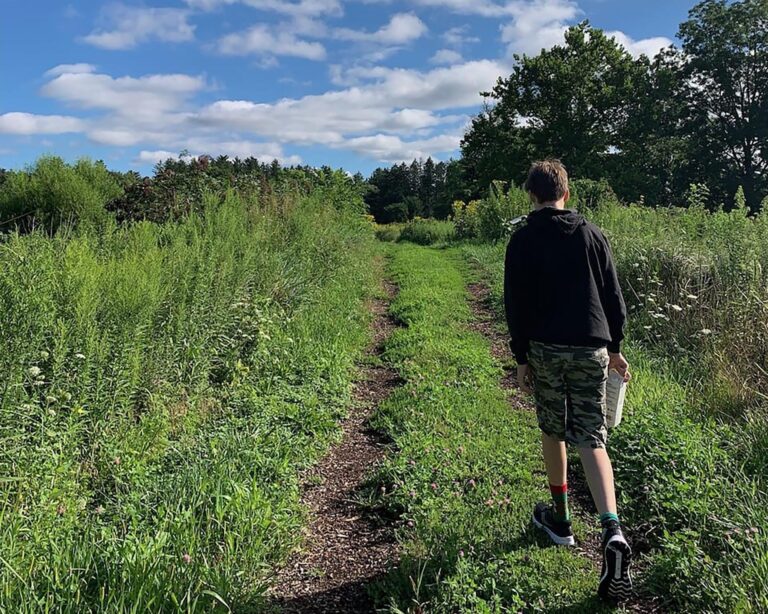
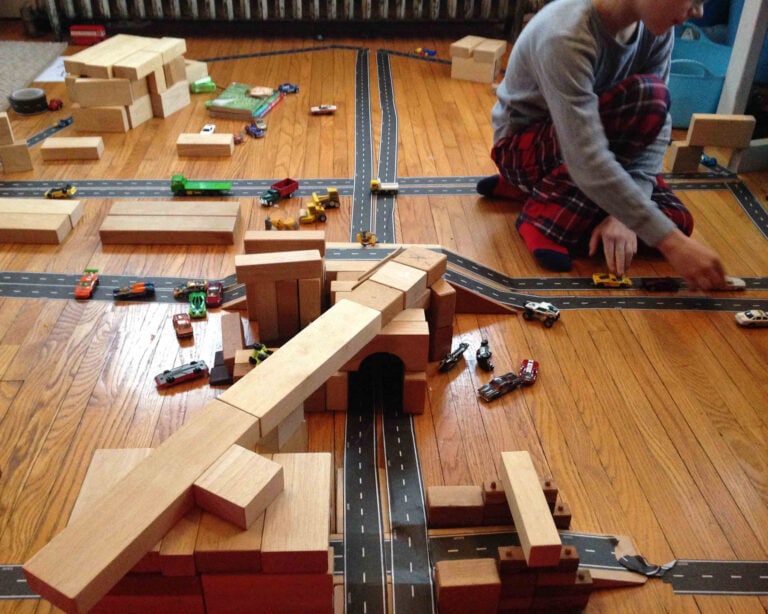
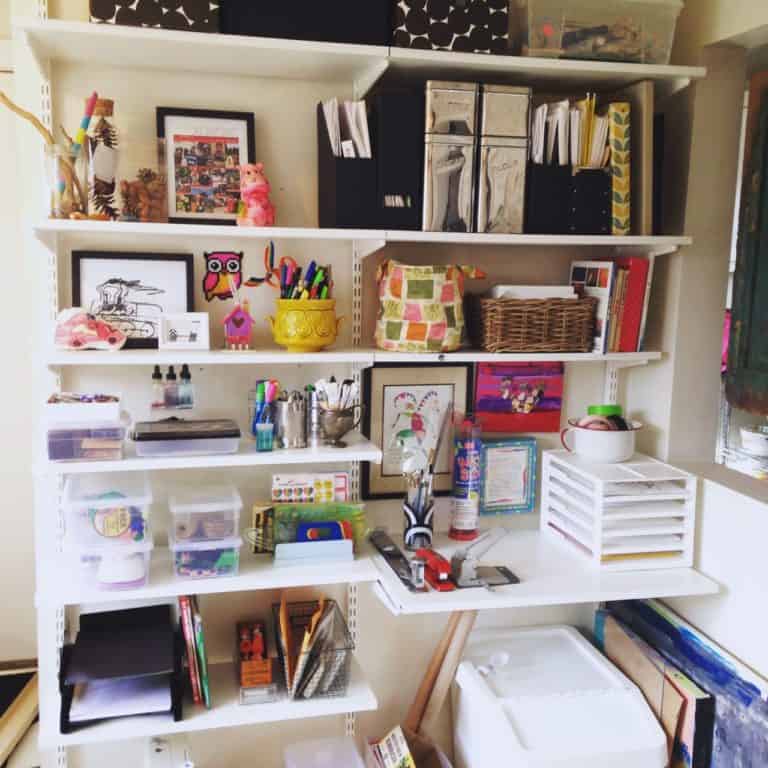

Thank you very much for this post, it has certainly answered several of my doubts and I will start to be more attentive and put your advice into practice. I take this opportunity to wish you a happy 2019 and many family joys and successes in your projects. A hug from El Salvador.
Hi Reina! Let me know if you have any other questions. It was good for me to write this post to remind myself of lots of things….it’s Christmas break here and I’ve had kids at home for 2 weeks.: P
Thank you for the post. My (2nd grade) son is struggling with every single thing that you address here, and we are considering homeschooling him because he is just refusing to do anything at school. The teacher is trying to help as much as possible, but the reality is that he will fail if he can’t move forward and complete assignments. He is spending recess, lunches, and even his specials (PE,/Music, etc.) time finishing assignments. I’m at the end of my rope. Can you offer any advice on how you are able to get your son to engage more at school? Every single morning starts with a freak out. The less he achieves at school the worse this is getting.
Hi Jamie, I am so sorry to hear this. My heart goes out to you because I know how tough this is. I have had so many meetings with teachers and administrators. Have you asked your son about specific issues that he is having? Are there certain subjects or incidences that send him reeling? Do you have a 504 in place for him? We get a lot of accommodations(work can be handed in late, reduced amount of homework, etc) with that. If you haven’t read Ross Greene’s book, The Explosive Child, that will be extremely helpful. along with his website. I’d try to pinpoint one or two issues and deal with them one at a time. Are there other options before homeschool? Montessori? Let me know if you are familiar with Ross Greene – he is the best first step. I am sending you loads of good vibes.
I haven’t heard of him until crossing your blog. I will definitely look into it. He doesn’t have a 504 in place yet because they are already doing for him all that he would have with a 504. She is sending work home, giving him multiple days for tests, sending him to a quiet room to work with another teacher, etc. We are using Calm for magnesium, dha/omega 3 supplements, cutting down on sugar and gluten, and removing artificial colors. He needs a ton of exercise, and it is SO rainy in GA every winter. We have always noticed that everything is harder during winter months. I am only considering homeschooling because he is giving up. He just sits there for hours and then we have to do the work in the afternoons. This takes away the time I need to spend helping my other 2 kids. If he is struggling, the whole house is struggling. Our last ditch effort for the school year is an incentive sheet at school based on effort. He gets a prize if he completes his work each day, and can work toward a bigger prize if he does it 5 days in a row. I guess we will see. 🙁 Thank you for sharing your story.
Jamie, sounds like school is supportive, which is great. I hear you on the movement. We have an indoor tramp, exercise balls, hippity hops, and an indoor bike!! That stuff really keeps us moving in the snowy winters here. How is he on the sleep front?
I’m late seeing this, but Never let them take recess, lunch, or specials away! That can’t happen. An IEP gives you the right to shorter assignments in and out of class, and that can help tremendously because it takes pressure off. Finishing full assignments doesn’t matter nearly as much as letting him have those other things. ADHD kids Must have motion and variety. They are making things worse. Also, try an exercise band around his chair legs. That can also do wonders. His mental health matters far more than his grades. Never let anyone tell you otherwise.
totally agree with you!! As a teacher, I do everything I can to get outside everyday with all of my students…even grabbing an extra ten minutes if I can!!
He usually has a hard time falling asleep, so we have to stay strict about the nighttime routine, but after he falls asleep he is out for 10+ hours.
10 plus hours is excellent. Have you tried a weighted blanket? My son would get up 5 times to go to the bathroom, call for us, sing, whistle, etc until we got the blanket. My husband has also just started to do Smiling Mind (a meditation app) with him every night. Both are extremely helpful – I wish I had purchased a blanket years ago!!
I read about it on your blog. I’ve actually been hearing about people using them for other things as well. Migraines, insomnia, etc. Thank you!
Thank you so much for this post. My almost 5 year old gets frustrated so easily. I know that my reactions of yelling don’t help the situation. I’ve recently started using printable activity cards so my son can see what activities we are going to be doing that day which seems to help. We are going to continue working on helping him deal with his frustration.
Hi Amber, Glad you found us! Yes, going over the schedule does really help keep the surprises to a minimum. Sounds like you have some good things in place. Bravo.
Hi. My son was just diagnosed with ADHD last week. It took me a while to figure out why he did the things he did, but we finally got the diagnose.
I want to say that this post gave a few ideas and helped me see where I can improve and howni can work with my kid.
I do have a question. How do I work on not feeling bad for pushing him too hard before? I was too harsh and I used to think he was lazy, now I understand this was all because of the ADHD but in still stuck with the same feelings of frustration when he doesn’t want to do homework or when he doesn’t pay attention. What can I Do
Laura, yes, the guilt can be heart breaking. I spent years putting my son in time outs, etc…and probably made it worse. But at the time, I thought I was doing the right thing. The thing is we are all doing the best we can at the given moment. The way I was parented does not work for my son. So, I’ve had to learn a whole new way – and I am still learning. Be gentle with yourself and grateful you are learning new things. Your son is still so young and you have so much time to do some learning and try a new way. I really recommend Ross Greene’s books….they have been so helpful to me. Check back in and let me know how it’s going. You got this!
This has been so helpful. My second grader struggles with frustration and anger. As I was reading I felt like you were describing him! I worry about how that plays out with peers and I also have a 2 year old who is learning those same behaviors as he sees them. We are doing play therapy and OT which are helpful. I feel like I have a hard time knowing what truly is a difficulty versus what is an attempt at a manipulation. He is very intelligent way beyond grade level academically, and definitely will try to manipulate things if he can. Parent guilt is no joke and hearing other experiences is so helpful! Thank you!
Hi Ashley! Thanks, it is nice to know others are going through this. I usually try to always think there is something getting in the way of better behavior…an unsolved problem or lagging skill. Kids want to do well when they can. I love Ross Greene’s books…they have been so helpful!
I ordered it as soon as I read this and it arrived yesterday. Can’t wait to read it!
Let me know how you like it…he has a great podcast too. I always feel like he talking directly to me!!
I had a bit of an advantage in raising my two ADHD kids. I’m ADHD myself althout i didnt know it until i was an adult. I frequently found myself thinking back to my childhood and what would have helped me. Much of your advice is good and reasonable but I want to add: involve the kids in the solutions. Brainstorm with them on how they can get through things. My oldest is was extremely hyper and hadn’t taken regular naps free she turned three. We were starting all day kindergarten and they had afternoon naps. I knew she couldnt just lay there doing nothing for 20 minutes. So we talked about how she could handle it. First I explained the situation and asked her how she though she could occupy the time and then I asked more questions, listened again and then finally made some suggestions of my own. If you know meltdown inducing situations are coming up, brainsorm. You would be surpised what they can come up with on their own. It wont solve everything but preparation helps. Homework was horrible. The rule was snack and discuss day (basically complain and get loving), then 45 minutes of hard fun exercise when they got home . Short burst of concentrating on homework ( no more than 10 to 25minutes depending on age) then a 10 minute crazy exercise break. Sometimes it took 2 hours to get through what should have been half an hour. Church was a one pass to get up and go to the bathroom when you just couldn’t sit anymore_but only one so you better save it for when you really need it. Those were all ideas the kids came up with themselves that worked. My kids are 25 and 21 today -still ADHD but productive, reasonably happy adults. Train your kids to find their own solutions to the inevitable frictions of being ADHD in a nonADHD world.
Yes!!! Thanks for your helpful comments. I talk about getting the kids input in my Ross Greene post….I use it when digging under the behavior, but I love your idea about just having kids come up with solutions when you know they will have trouble. Gets them to be problem solvers. Great ideas!!!!
I found your blog two months ago when my 9 year old son was diagnosed with ADHD and Dyslexia. Many of your posts have helped me so much. Every day there are new mountains to climb, but your posts have helped me realize I’m not alone. I’m finding it particularly difficult right now to help him through his anger and frustration over his reading difficulties. He sees a specialized reading tutor 3x each week, but now that just seems to frustrate him more. He understands he needs the help, but struggles with not understanding that it will take time to overcome his severe reading difficulties.
Hi Lyndsay! Thanks for reaching out. Is your son’s tutor trained in the Orton Gillingham method? I have no personal experience just heard its awesome and multi-sensory. My younger son has trouble writing and it has been about a 3 year journey so far and he still struggles. But, things are moving forward, slowly, but forward. Look at progress. You are already doing an awesome job! We mama’s need tough skin. I think I’m a dragon, by now.
Beth- you really know what you are talking about! It has been such a long journey, but when I found Ross Greene my whole mindset changed. My youngest (out of 4) has an ADHD label and nothing we did with the older kids works for her. We know we still have a long road ahead, and I look forward to learning more from you as we continue on. And an Orton-Gillingham based method for reading is definitely the way to go for our kids. After years of intervention through school, we started her on an OG program and reading is finally starting to click. Thank you for sharing your knowledge and positivity.
Hi Janet! Thanks for writing. I have heard so much about Orton Gillingham. As a teacher, I’m curious to know more, I’d love to take the training for it. Sounds like you are a seasoned parent with lots of great knowledge. : )
HI Beth! I’m so glad I found this! We are just beginning our journey with ADHD and to say I’ve been feeling overwhelmed is an understatement. It all began at the beginning of the covid pandemic when my 7 year old started having severe anxiety. We ended up in therapy and she’s on anxiety meds. In the course of her therapy her totally awesome therapist asked me if my daughter had ever been tested for ADHD. While we have suspected it in the past and even discussed it with her pediatrician it now has gotten worse. We homeschool and this will not only help our every day lives but hopefully will make our homeschool life go so much smoother this year.
Hi Alicia, Glad to have you here! Yes, COVID worsened my son’s symptoms – especially his anxiety. Anxiety is probably the hardest part of his ADHD. You are probably a pro at homeschooling! Do you have any advice for us all who may find ourselves homeschooling again? : )
Do you have suggestions on how to handle frustrations at school? My adhd boy is 8, and his teacher is phenomenal. But he is very hard on himself. He tries to perfect things/drawings/writing. And when he can’t. He gets frustrated/angry, and you can see he very much internalizes it. We struggling with ways to help him cope.
Alexis, I am sorry that you and your boy are going thru this. There is a positive side to it, in that he is putting a lot of effort into his work. I’d praise the effort and not the final outcome and also focus on the enjoyment of the work he is doing. I know our kids can be the way they are despite all of our good efforts! You may already be doing this, but normalize mistakes at home with you and any other family member. Talk outloud a bout this or that being good enough – like cleaning the kitchen. “Oh, I won’t wipe the counters today. Let’s go read a book instead,” etcHave you dug into why he does work over? Can his teacher or a school therapist talk with him about the reasons why he does things over to perfection? Perhaps there is pressure from some unknown source or he misunderstands the expectations on him? The teacher can support you in talking about when something is “good enough”. I do think this is very common…I hope one of these suggestions can help ease the issue, even a little, for you. You have given me a great idea for a blog post! Stay tuned!!